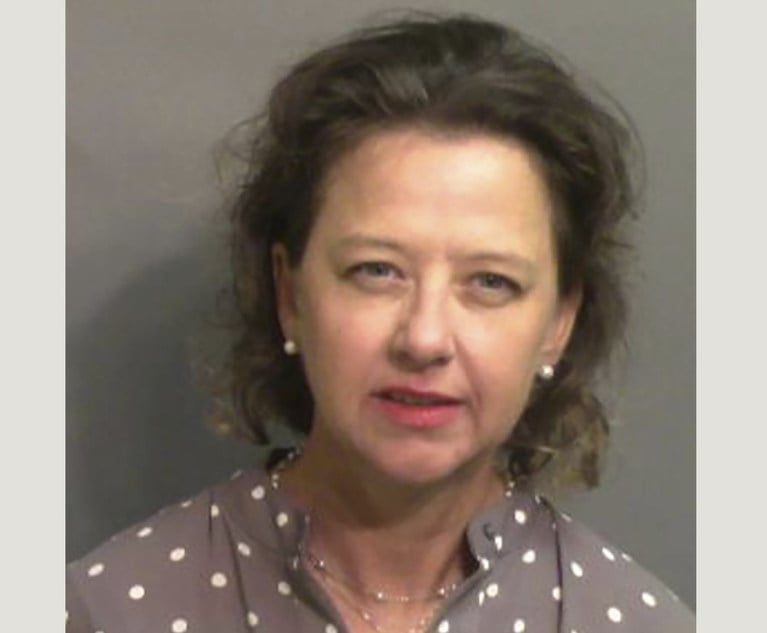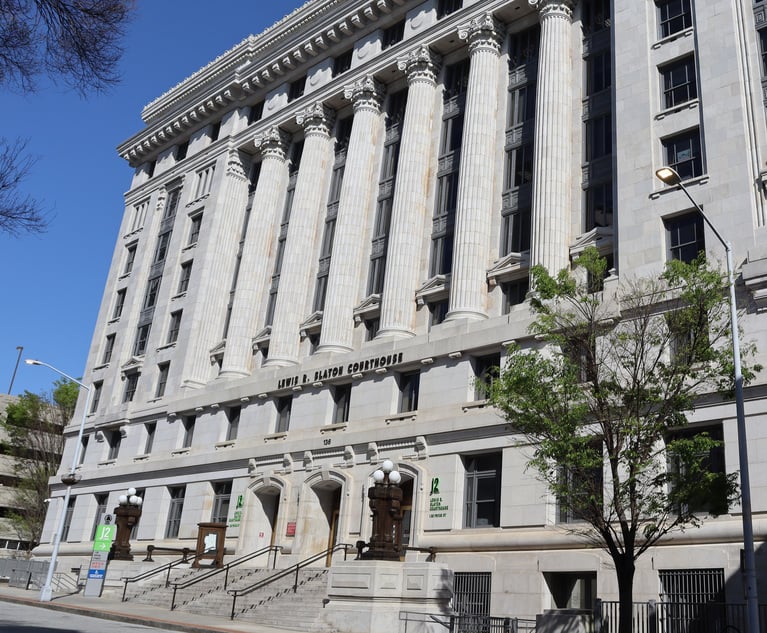Defense Uses Detective's Testimony to Highlight Contention That McIver Shooting Was Unintentional
Atlanta attorney Tex McIver's defense lawyer, Bruce Harvey, elicited testimony that an Atlanta homicide detective had suggested Diane McIver's shooting was an accident as Assistant District Attorney Clint Rucker questioned omissions in the police investigation.
March 30, 2018 at 06:41 PM
6 minute read
 Bruce Harvey questions Darrin Smith at the Fulton County Courthouse on March 30. (Pool photo: Steve Schaefer/Special to the AJC)
Bruce Harvey questions Darrin Smith at the Fulton County Courthouse on March 30. (Pool photo: Steve Schaefer/Special to the AJC)
Defense attorneys Friday attempted to show Atlanta detectives were originally on the right track in thinking Diane McIver's shooting death was an accident, before prosecutors intervened and charged her husband with murder.
Defense lawyer Bruce Harvey pointed out, as the third week of testimony in McIver's murder trial came to a close, that Atlanta Police Detective Darrin Smith had suggested during an interview with Dani Jo Carter early in the investigation that it was an accident. Carter is the sole witness to the shooting.
“You said, 'We're just trying to figure out what happened. If it's an accident, it's an accident,'” Harvey said. “Ms. Carter told you, 'It's a horrible accident.' In response, you said, 'It sounds like that's what it is.'”
“That's correct,” Smith replied.
Harvey also attempted to distinguish between what he labeled an “accidental shooting” and an “unintentional discharge.” An accidental shooting, he suggested, would be one where a firearm would go off because it was dropped, bumped or otherwise knocked without human intervention.
“What you were talking about was a discharge of a weapon without intention,” Harvey suggested. He then reminded Smith that the detective told Carter during her recorded interview that there are instances “all the time” at the Atlanta Police Department where a trained police officer accidentally or unintentionally discharges their weapon.
“It's not an uncommon occurrence?” the defense attorney asked.
“As far as our police department—no,” Smith replied.
The trial adjourned Friday for spring break. It will reconvene on April 9, as prosecutors continue to press their case against Tex McIver, who is charged with the murder of his wife and three counts of influencing witnesses.
Harvey also highlighted Smith's 18 years of experience as a police officer. Smith said the McIver shooting was his 35th homicide case as a lead detective.
“You were trying to develop as much information as you could about the course of events,” Harvey said. “You weren't sitting on your hands, sitting on your thumbs … because you knew what to do.”
But Assistant District Attorney Clint Rucker, Harvey contended, was signaling to the jury that Smith was “doing a crummy job, that you didn't investigate it right.”
In questioning the detective on the stand, Rucker posed a series of questions that highlighted a laundry list of things the homicide detective did not do during his investigation—which police had largely wrapped up within two weeks of the shooting without pressing charges. Investigators with the district attorney's office later filled in those gaps during what became a murder investigation under their jurisdiction.
Rucker also suggested that from the beginning, Smith was taking his lead from Stephen Maples, a criminal defense lawyer McIver called while medical personnel were trying to save his wife's life at Emory University Hospital. Maples had arrived within 15 minutes, witnesses have said.
Rucker's questions, and Smith's responses, also suggested Smith failed to take steps in some cases that would have raised questions about whether the shooting was actually an accident. He also didn't attempt to corroborate statements McIver and his attorney made, or pursue what prosecutors have argued was a financial motive for McIver to intentionally kill his wife.
Smith's omissions included his decision not to ask McIver how the gun went off, or demonstrate precisely how he was holding it. A crime scene reconstruction expert testified Thursday that general descriptions by Maples and McIver about how he was holding the gun were inconsistent with the trajectory of the bullet.
Smith also appeared to take McIver at his word, during his only interview with the attorney, that McIver hadn't fired the Smith & Wesson .38 special “in about two years.” Numerous witnesses have testified that McIver routinely shot guns at the couple's 85-acre ranch and that he was a stickler for safety.
Smith also didn't inquire as to whether the revolver was in single-action mode, with the hammer cocked, or double-action, which would have required significantly more pressure to pull the trigger.
“I didn't believe it was a relevant question,” he said. “The trigger was pulled. Whether it was single- or double-action wouldn't have made any difference.”
Smith also didn't question any of the nurses at Emory's emergency room, some of whom testified they overheard McIver and his lawyer discussing what he should say about the shooting, or to whom McIver had given conflicting explanations. Smith said he interviewed only Dr. Susanne Hardy, whose name Maples gave to him. Hardy has testified that Diane McIver told her the shooting was “an accident,” but that she also said she did not want to see her husband before she was taken to surgery.
Rucker reminded Smith that he was dismissive of nurses, suggesting they were “kind of junior detectives” and “a hotbed of rumor and innuendo.”
“Those are not necessarily my words,” Smith responded, while agreeing that, as matter of practice, he only interviews physicians in homicide cases. “My wife would get mad at me. She's a nurse.”
Smith also acknowledged that he had returned the Ford Expedition the shooting occurred in to Tex McIver two days later. When prosecutors asked that the SUV be re-impounded, Smith said he called Maples. The vehicle appeared to have been cleaned when it was returned, he said.
Smith also acknowledged that while he obtained a number of financial records associated with Tex and Diane McIver, they were incomplete. Although he said he reviewed them, “Analyze would be a pretty strong word. I looked at a bunch of numbers and really didn't understand them. There was money going in, money going out.”
“Did you determine there may have been a financial motive behind this crime?” Rucker asked.
“No,” Smith replied. “I did not.”
This content has been archived. It is available through our partners, LexisNexis® and Bloomberg Law.
To view this content, please continue to their sites.
Not a Lexis Subscriber?
Subscribe Now
Not a Bloomberg Law Subscriber?
Subscribe Now
NOT FOR REPRINT
© 2024 ALM Global, LLC, All Rights Reserved. Request academic re-use from www.copyright.com. All other uses, submit a request to [email protected]. For more information visit Asset & Logo Licensing.
You Might Like
View All
Glynn County Judge Rejects Ex-DA's Motion to Halt Her Misconduct Trial in Ahmaud Arbery Investigation

Trump Election-Interference Prosecution Appears on Course to Wind Down
4 minute read
Judge Sets Early 2025 Trial for Ex-Prosecutor Charged With Meddling in Ahmaud Arbery Investigation
3 minute read
Rapper Young Thug Is a Free Man. Here Are Things to Know About His Plea.
8 minute readTrending Stories
- 1Call for Nominations: Elite Trial Lawyers 2025
- 2Senate Judiciary Dems Release Report on Supreme Court Ethics
- 3Senate Confirms Last 2 of Biden's California Judicial Nominees
- 4Morrison & Foerster Doles Out Year-End and Special Bonuses, Raises Base Compensation for Associates
- 5Tom Girardi to Surrender to Federal Authorities on Jan. 7
Who Got The Work
Michael G. Bongiorno, Andrew Scott Dulberg and Elizabeth E. Driscoll from Wilmer Cutler Pickering Hale and Dorr have stepped in to represent Symbotic Inc., an A.I.-enabled technology platform that focuses on increasing supply chain efficiency, and other defendants in a pending shareholder derivative lawsuit. The case, filed Oct. 2 in Massachusetts District Court by the Brown Law Firm on behalf of Stephen Austen, accuses certain officers and directors of misleading investors in regard to Symbotic's potential for margin growth by failing to disclose that the company was not equipped to timely deploy its systems or manage expenses through project delays. The case, assigned to U.S. District Judge Nathaniel M. Gorton, is 1:24-cv-12522, Austen v. Cohen et al.
Who Got The Work
Edmund Polubinski and Marie Killmond of Davis Polk & Wardwell have entered appearances for data platform software development company MongoDB and other defendants in a pending shareholder derivative lawsuit. The action, filed Oct. 7 in New York Southern District Court by the Brown Law Firm, accuses the company's directors and/or officers of falsely expressing confidence in the company’s restructuring of its sales incentive plan and downplaying the severity of decreases in its upfront commitments. The case is 1:24-cv-07594, Roy v. Ittycheria et al.
Who Got The Work
Amy O. Bruchs and Kurt F. Ellison of Michael Best & Friedrich have entered appearances for Epic Systems Corp. in a pending employment discrimination lawsuit. The suit was filed Sept. 7 in Wisconsin Western District Court by Levine Eisberner LLC and Siri & Glimstad on behalf of a project manager who claims that he was wrongfully terminated after applying for a religious exemption to the defendant's COVID-19 vaccine mandate. The case, assigned to U.S. Magistrate Judge Anita Marie Boor, is 3:24-cv-00630, Secker, Nathan v. Epic Systems Corporation.
Who Got The Work
David X. Sullivan, Thomas J. Finn and Gregory A. Hall from McCarter & English have entered appearances for Sunrun Installation Services in a pending civil rights lawsuit. The complaint was filed Sept. 4 in Connecticut District Court by attorney Robert M. Berke on behalf of former employee George Edward Steins, who was arrested and charged with employing an unregistered home improvement salesperson. The complaint alleges that had Sunrun informed the Connecticut Department of Consumer Protection that the plaintiff's employment had ended in 2017 and that he no longer held Sunrun's home improvement contractor license, he would not have been hit with charges, which were dismissed in May 2024. The case, assigned to U.S. District Judge Jeffrey A. Meyer, is 3:24-cv-01423, Steins v. Sunrun, Inc. et al.
Who Got The Work
Greenberg Traurig shareholder Joshua L. Raskin has entered an appearance for boohoo.com UK Ltd. in a pending patent infringement lawsuit. The suit, filed Sept. 3 in Texas Eastern District Court by Rozier Hardt McDonough on behalf of Alto Dynamics, asserts five patents related to an online shopping platform. The case, assigned to U.S. District Judge Rodney Gilstrap, is 2:24-cv-00719, Alto Dynamics, LLC v. boohoo.com UK Limited.
Featured Firms
Law Offices of Gary Martin Hays & Associates, P.C.
(470) 294-1674
Law Offices of Mark E. Salomone
(857) 444-6468
Smith & Hassler
(713) 739-1250






